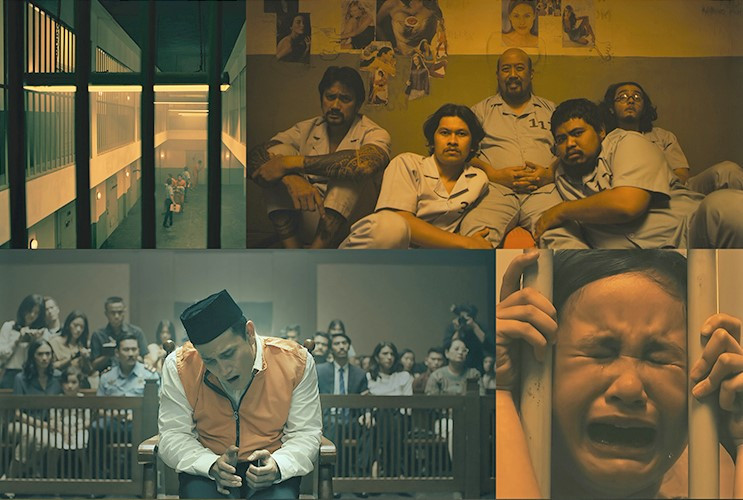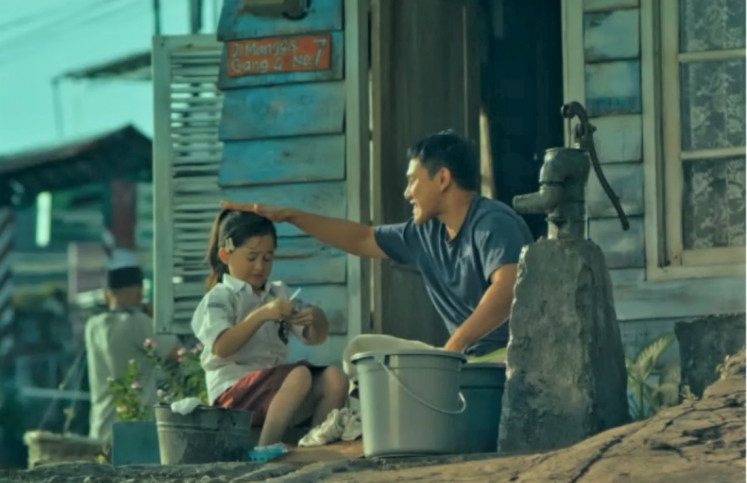Popular Reads
Top Results
Can't find what you're looking for?
View all search resultsPopular Reads
Top Results
Can't find what you're looking for?
View all search resultsVino Bastian gets personal in remake of Korean hit ‘Miracle in Cell No. 7’
Change text size
Gift Premium Articles
to Anyone
T
he Indonesian adaptation of the critically acclaimed 2013 South Korean comedy-drama film Miracle in Cell No. 7 is slated to be released sometime this year.
Since its initial announcement in March, and despite the temporary closure of movie theaters due to the pandemic, production house Falcon Pictures has released several stills from the movie on its Instagram page @falconpictures to keep fans content after making its initial announcement in March.
Directed by Hanung Bramantyo, the adaptation also features an all-star cast including Vino G. Bastian, Tora Sudiro and Denny Sumargo.
Producer Frederica said during a virtual press conference on Monday that she was interested in creating a remake because Miracle in Cell No. 7 was a great film in its own right.
Prior to the Indonesian adaptation, Miracle in Cell No. 7 had already been remade twice – in the Philippines with the same title and in Turkey as 7. Koğuştaki Mucize.
In its home country, the movie attracted around 12.8 million cinemagoers, making it the seventh highest-grossing film in South Korea.
The original Miracle in Cell No. 7 follows the story of a mentally challenged man named Lee Yong-gu (Ryu Seung-ryong), who is wrongfully imprisoned for murder. While serving time, he befriends the hardened criminals sharing his cell, who later help him reunite with his daughter Ye-sung.
Vino, who plays the main character Dodo Rojak, said the original version was one of his favorite movies because he had a daughter of the same age as one of the characters.
“That was why I was really excited when I received the offer, and when it came to the crying scenes in the movie, I cried for real because I was reminded of my own daughter,” he said.
Hanung said the weight of expectations he carried for the latest movie was comparable to Bumi Manusia (This Earth of Mankind), as the source material for both titles were already famous. Bumi Manusia, which he directed, was based on the novel by legendary Indonesian author Pramoedya Ananta Toer.
“Moreover, it’s [based] on a movie. Novels are based on text, so people can imagine them differently. This [adaptation] comes from a film, so people have seen how the story goes and who the cast are,” he said.
“Whatever the adaptation, the story is still the same and we already know the ending, so there’s obviously a lot of pressure that goes with making the movie.”
Hanung said the plot of the original movie dealt with crimes and laws in the country in which it was made, so the adaptation would not necessarily conform to Indonesian laws for the sake of the story.
“Our country is democratic, but it’s still learning about freedom of expression, so we don’t want to show that it is Indonesia with its president and government – we set this [adaptation] in its own country and city, and even the prison’s name is fictitious.”
Though the plot will closely follow the source material, some elements in the movie have been modified to suit Indonesian culture.
For example, Dodo’s house is located just 30 centimeters away from train tracks, which Hanung said was a common sight in big cities like Jakarta.
“So it’s really interesting if we can explore themes in that context, especially when the theme centers on poor families. It’s like, [they] can’t actually ride the trains because they don’t have the money, but at the same time they are really close to them.”
The film is the latest Indonesian adaptation of a South Korean film, following Bebas (Free), the remake of the 2011 film Sunny, by Mira Lesmana and Riri Riza last year.
The South Korean film industry achieved historic success earlier this year, with dark comedy thriller Parasite sweeping the awards at the Oscars.












